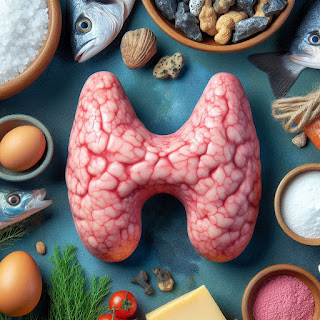Understanding Iodine: Functions, Benefits, Food Sources, Deficiency and Excess Health Issues, and Prevention Tips
Understanding Iodine: Functions, Benefits, Food Sources, Deficiency and Excess Health Issues, and Prevention Tips
Introduction
Welcome to Sara Nutrition! Today, we're shedding light on a vital yet often overlooked mineral – Iodine. Essential for numerous bodily functions, iodine plays a crucial role in maintaining our health. Let's explore its functions, health benefits, food sources, potential health problems from deficiency and excess, and tips for maintaining optimal iodine levels.
Functions of Iodine
Thyroid Hormone Production: Iodine is integral to the synthesis of thyroid hormones thyroxine (T4) and triiodothyronine (T3), which regulate metabolism.
Metabolic Regulation: These hormones control metabolic rate, influencing energy production, heart rate, and body temperature.
Development and Growth: Critical for brain and nervous system development, especially during fetal growth and early childhood.
Health Benefits of Iodine
Thyroid Health: Proper iodine levels ensure healthy thyroid function, preventing conditions like goiter and hypothyroidism.
Cognitive Development: Adequate iodine is crucial for brain development and cognitive function, particularly in infants and children.
Immune Support: Iodine helps bolster the immune system, offering protection against infections.
Detoxification: It aids in the removal of toxins and heavy metals from the body.
Food Sources of Iodine
Seafood: Fish (such as cod and tuna), shrimp, and seaweed are rich in iodine.
Dairy Products: Milk, cheese, and yogurt provide a significant amount of iodine.
Iodized Salt: A common and easily accessible source of iodine.
Eggs: Another good source, particularly the yolk.
Fruits and Vegetables: Especially those grown in iodine-rich soil, such as potatoes and cranberries.
Deficiency Health Problems
Goiter: Enlarged thyroid gland due to insufficient iodine intake.
Hypothyroidism: Symptoms include fatigue, weight gain, cold intolerance, and depression.
Cognitive Impairment: In children, iodine deficiency can lead to developmental delays and lower IQ.
Pregnancy Complications: Inadequate iodine can result in miscarriages, stillbirth, and congenital abnormalities.
Cretinism: Severe iodine deficiency during pregnancy can cause cretinism, characterized by stunted physical and mental growth.
Excess Health Problems
Hyperthyroidism: Overactive thyroid, leading to symptoms like rapid heartbeat, weight loss, and anxiety.
Thyroiditis: Inflammation of the thyroid gland.
Goiter: Excessive iodine can also cause thyroid gland enlargement.
Gastrointestinal Issues: High iodine intake may lead to nausea, stomach pain, and diarrhea.
Prevention Tips
Balanced Diet: Ensure a diet that includes a variety of iodine-rich foods like seafood, dairy, and iodized salt.
Monitor Intake: Be mindful of iodine intake, especially if you consume supplements or iodine-rich foods regularly.
Consult Healthcare Providers: Seek advice from healthcare professionals, particularly for pregnant women, to ensure adequate iodine levels.
Avoid Excessive Supplementation: Unless prescribed by a healthcare provider, avoid excessive iodine supplements.
Iodine, though required in small amounts, plays a significant role in maintaining our health. From supporting thyroid function to aiding cognitive development, its benefits are vast. By including iodine-rich foods in your diet and being mindful of your intake, you can prevent both deficiency and excess-related health problems. Stay informed, stay healthy, and keep nourishing your body with the right nutrients.
Thank you for joining us on this journey through the essential world of iodine. For more nutritional insights and health tips, stay connected with Sara Nutrition
Have questions or comments about iodine? Drop them below, and let’s continue the conversation! Don’t forget to like, share, and follow for more health and nutrition tips. That's all for today! Remember, a balanced diet is key to a healthy life. See you next time with more nutritional wisdom!










Comments
Post a Comment